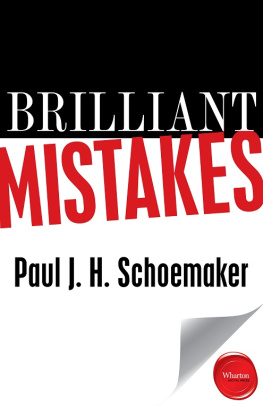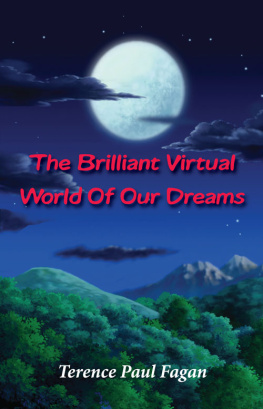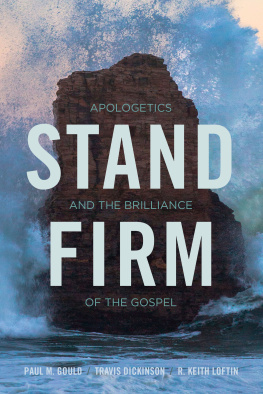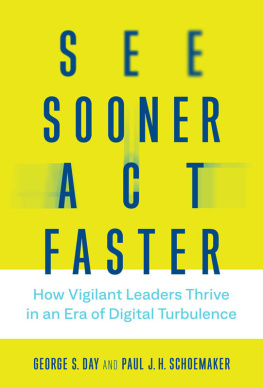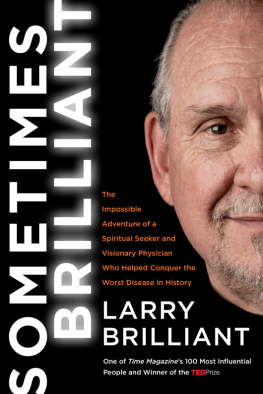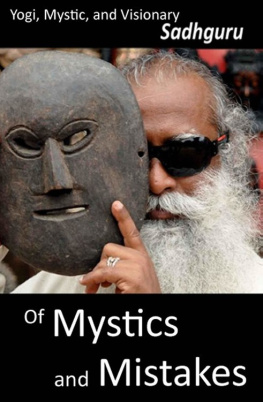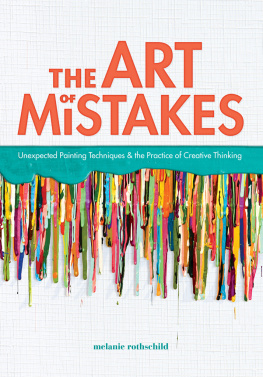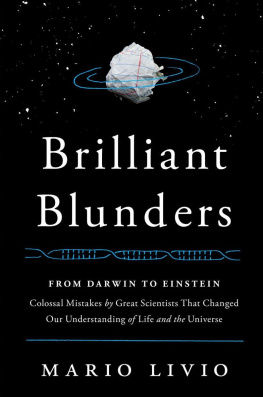Paul J. H. Schoemaker - Brilliant Mistakes
Here you can read online Paul J. H. Schoemaker - Brilliant Mistakes full text of the book (entire story) in english for free. Download pdf and epub, get meaning, cover and reviews about this ebook. genre: Romance novel. Description of the work, (preface) as well as reviews are available. Best literature library LitArk.com created for fans of good reading and offers a wide selection of genres:
Romance novel
Science fiction
Adventure
Detective
Science
History
Home and family
Prose
Art
Politics
Computer
Non-fiction
Religion
Business
Children
Humor
Choose a favorite category and find really read worthwhile books. Enjoy immersion in the world of imagination, feel the emotions of the characters or learn something new for yourself, make an fascinating discovery.
- Book:Brilliant Mistakes
- Author:
- Genre:
- Rating:5 / 5
- Favourites:Add to favourites
- Your mark:
- 100
- 1
- 2
- 3
- 4
- 5
Brilliant Mistakes: summary, description and annotation
We offer to read an annotation, description, summary or preface (depends on what the author of the book "Brilliant Mistakes" wrote himself). If you haven't found the necessary information about the book — write in the comments, we will try to find it.
Brilliant Mistakes — read online for free the complete book (whole text) full work
Below is the text of the book, divided by pages. System saving the place of the last page read, allows you to conveniently read the book "Brilliant Mistakes" online for free, without having to search again every time where you left off. Put a bookmark, and you can go to the page where you finished reading at any time.
Font size:
Interval:
Bookmark:
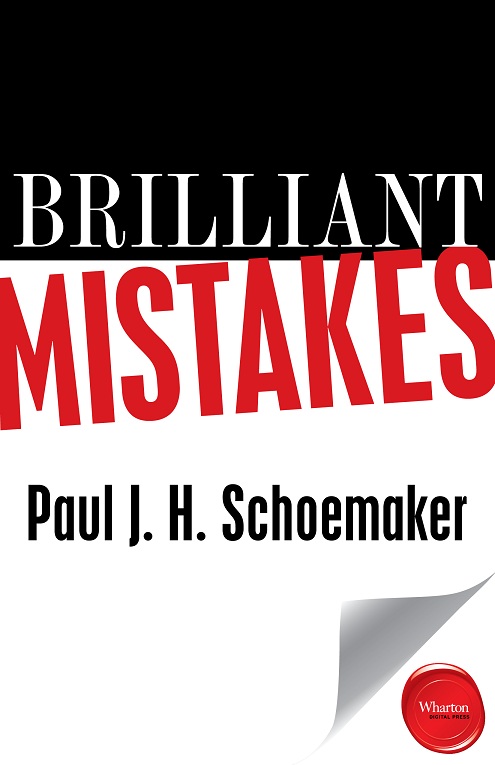
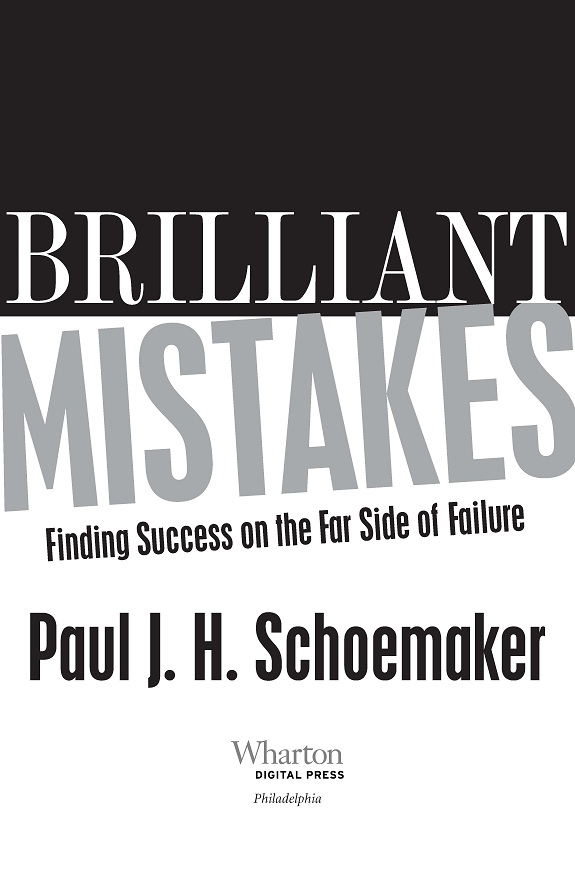
This book is dedicated to the memory of Robert E. Gunther. Over the course of several decades, Robert and I collaborated on three earlier books and various articles. He also provided invaluable editorial support on countless other projects. Along the way, he became a dear friend. In 2006, we coauthored an article for the Harvard Business Review titled The Wisdom of Deliberate Mistakes. That article provided the impetus for this book.
Robert and I worked as coauthors for over a year to conceptualize Brilliant Mistakes as a book. We hoped to produce a popular trade book that would reach a general audience. With the generous and expert help of our literary agent, Jill Marsal, we collaborated on a proposal and outlines for each chapter. Sadly, Robert died in the summer of 2009 before our proposal was ready. Simultaneously, the market for trade books experienced a decline, which further delayed completion.
I hope that Robert would have approved of Brilliant Mistakes in its new form. As I reworked the manuscript, I missed Roberts keen mind, turn of phrase, deep curiosity, and remarkable work ethic. More than all else, I especially miss his friendship. As difficult as it was to deal with his loss and move forward, I am grateful I had the chance to work with Robert and to witness the strength, grace, and courage he brought to his fight with a very tough illness. I am happy that the project we began together has finally come to fruition, for his familys benefit and in his memory.
Preface
Introduction: When Wrong Is Right
Part One: Rethinking Mistakes
Chapter 1: Context Matters: Defining Mistakes
Chapter 2: Not All Errors Are Equal: Brilliant Mistakes
Chapter 3: Why and How We Err: Causes and Remedies
Part Two: Designing for Mistakes
Chapter 4: Faster Learning: A Practical Road Map
Chapter 5: Deliberate Mistakes: Creating Portals of Discovery
Chapter 6: Portfolio of Mistakes: Hedging Conventional Wisdom
Part Three: Putting It All Together
Chapter 7: The Prepared Mind: Detecting Anomalies
Epilogue: Musing About Mistakes
Appendix A: Einsteins 23 Mistakes
Appendix B: Expected Utility Analysis
Appendix C: Portfolio Justifications
Appendix D: How Your Mind Plays Tricks
Acknowledgments
Notes
About the Author
Mistakesare the portals of discovery.
James Joyce
If you have ever flown in an airplane, taken an antibiotic, or used electricity from a nuclear power plant, you have firsthand experience with the power of mistakes. Each one of those innovations resulted from a flash or two of brilliant insight and many, many years of wrong answers, dead ends, and missteps.
The ill-fated flight at Kitty Hawk showed how an idea that seems impossibly wrong can be achieved by two Wrights. Alexander Flemings accidental discovery of penicillin, the worlds first and most successful antibiotic, involved a sloppy lab, keen perception, and an exceptionally well-prepared mind. Scientists labored for decades to harness nuclear power, beginning with Einsteins landmark 1905 article in the Annals of Physics arguing that mass (m) can be converted into energy (E) via the formula E = mc2 (where c is the speed of light).
It would take several more decades before another brilliant scientist, Enrico Fermi, provided irrefutable empirical evidence in support of Einsteins famous formula. Using a converted squash court at the University of Chicago, Fermi was able to achieve the first-ever controlled release of nuclear energy in 1942. He later joined Oppenheimers Manhattan Project in Los Alamos, where they developed the worlds first atomic bomb, building on the earlier experiments in that converted squash court. The atom bomb proved Einsteins formula that E = mc2 with a big bang and brought the Second World War to a quick end. It also shows that mistakes can be beneficial to discovery and may be necessary to arrive at deep new insights. Even a genius like Einstein could not do without them.
Brilliant Mistakes examines the beneficial side of error by considering mistakes as portals of discovery. Through stories and analysis, I show that its possible to design for brilliant mistakesthose that accelerate learning and lead to breakthrough innovationand to avoid tragic ones. I also argue that all mistakes are not created equal. Some have high cost and offer little learning value, while others cost little and produce deep, valuable insight. These are the brilliant mistakes, the ones to embrace rather than avoid. This book will teach you how to recognize, foster, and reward them in yourself and others.
Think about the last time you tried something new, whether it was acquiring a language, learning a new sport, or starting a company. Did you make errors along the way? Did those errors help or hinder your progress toward your goal? The path from insight to discovery is seldom a straight line. Most groundbreaking achievements in science, technology, economics, and the arts represent long, meandering paths of misjudgments and false turns. Indeed, our very existence as humans relies on the error mechanism of random mutation; we would not exist if our evolutionary process had not included a few hiccups and false turns. But it isnt enough just to accept that mistakes are part of progress. We can do better than simply rely on random error to eventually point the way. We can, and should, learn to be strategic about the errors we allow.
Unfortunately, the systems that surround us make this a difficult proposition. Our schools and organizations are designed for efficiency and order. These are fine principles but rarely encourage mistakes, either brilliant or foolish. Students are graded on how much they know, not on the degree to which they learn from helpful errors. Similarly, companies strive for error elimination, hiring advisers and relying on sophisticated management tools such as Six Sigma. Its little wonder, then, that most decision-making books follow suit, encouraging you to focus narrowly on mistake avoidance today rather than provoking you to plan for the stream of decisions that you will face tomorrow.
Ironically, the University of Chicago, that bulwark of rational economic thinking propelled by Milton Friedman and other Nobel laureates in economics, launched the first academic center among business schools to study our less rational side. As a faculty member at the business schools Center for Decision Research, I spent twelve years among colleagues doing research on subjects that seemed, to some at the time, esoteric and off-kilter. We studied how experienced executives could be blinded by their frames of mind or why numerous traps and biases might cloud their judgment and choices. At first, most esteemed economists looked askance at our studies and findings. Paradoxically, it turned out to be a brilliant mistake for the University of Chicagos business school to encourage a small group of intellectually diverse scholars to challenge basic tenets underlying the rational economic model.
The field of behavioral decision theory has since gained great momentum across multiple academic disciplines. The principles that underlie itsuch as the idea that humans are error-prone, that consumers exhibit predictable biases, and that markets are not always efficienthave gained wide attention and infiltrated popular thought. In 2002, the Nobel Prize in Economics was awarded to Daniel Kahneman, a psychologist who was then at Princeton University. Such lofty recognition for research done by someone outside of economics is quite unusual, although not unprecedented. Kahnemans groundbreaking work in prospect theory as well as heuristics and biases, research he conducted mostly with another brilliant cognitive psychologist, the late Amos Tversky, showed that peoples decisions are strongly influenced by psychological factors.
Next pageFont size:
Interval:
Bookmark:
Similar books «Brilliant Mistakes»
Look at similar books to Brilliant Mistakes. We have selected literature similar in name and meaning in the hope of providing readers with more options to find new, interesting, not yet read works.
Discussion, reviews of the book Brilliant Mistakes and just readers' own opinions. Leave your comments, write what you think about the work, its meaning or the main characters. Specify what exactly you liked and what you didn't like, and why you think so.

